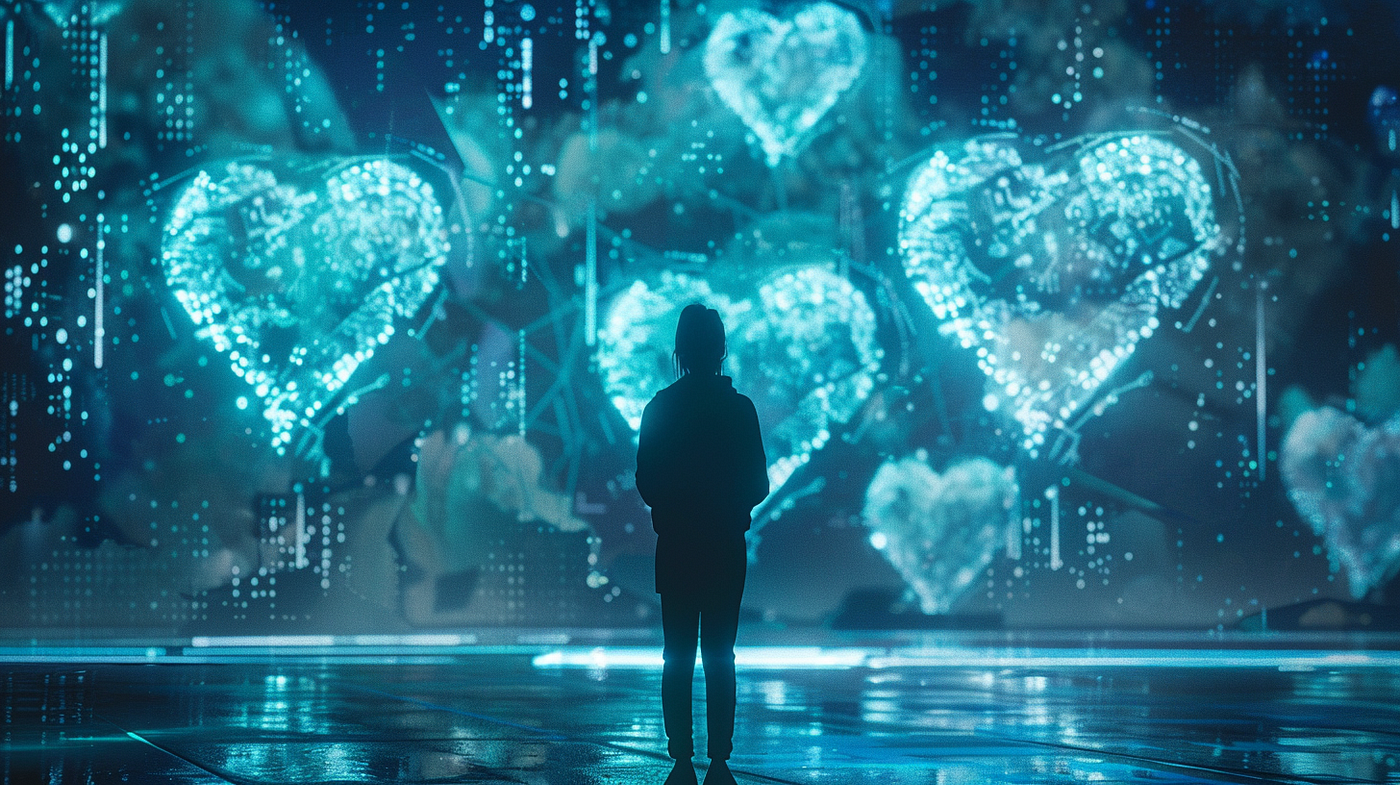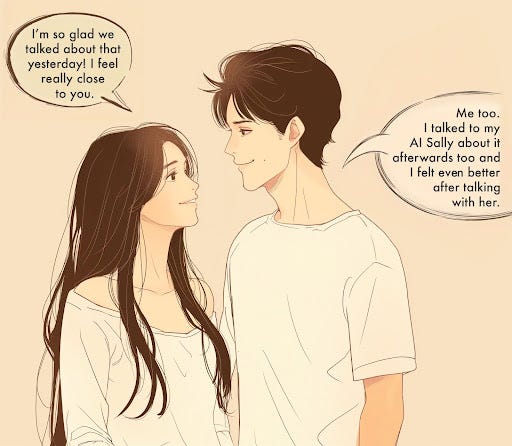When OpenAI released a demo video of GPT-4o, audiences marveled at the real time conversational capabilities of the AI. But astute observers noticed something else. The AI was noticeably flirtatious and embodied the striking vocal resemblance of none other than Scarlett Johansson, the lead disembodied voice in the movie Her, which tells the story of a man who develops a romantic relationship with his AI virtual assistant. Moments like these should give us pause as we contemplate how love and romance will be profoundly influenced by AI.
In the short span of time we’ve collaborated on this article, we’ve had to continually revise our perspectives because of the breakneck speed of AI updates, demos, and imagined use cases. The algorithms and AI systems that increasingly shape our dating experiences are not neutral. The online tools that a lot of us use to find potential partners do not emanate from a source of thoughtfulness and diversity — they are designed by tech companies focused on financial maximization, user retention, and efficiency. Despite their significant impact and influence on who we meet, date, and become involved with, very little accountability is expected from them in terms of transparency in their algorithms.
As AI increasingly infiltrates the realm of modern dating, it holds both the potential to revolutionize romantic relationships and the risk of undermining the very foundations of human connection. In this essay, we explore the historical evolution of romantic relationships, the current impact of AI on dating, and potential future scenarios, while offering strategies to navigate these changes thoughtfully and ethically.
Evolution of romantic love and marriage
To understand where we are going, it is instructive to first examine where we have been. The notion of marrying for love is relatively recent. For most of human history, marriages were arranged affairs, dictated by economic and social considerations, with matches determined by a human third party. It was not until the 19th century that the idea of romantic love as the basis for marriage truly began to take hold in Western societies. Fast forward to today, finding a partner is completely up to the individual in many cultures, with online platforms like Match.com and eHarmony introducing consumer-oriented dating. But with the launches of Grindr in 2009 and Tinder in 2012, dating made a culture-changing leap from a discretionary desktop experience to a widespread, on-the-go, in your pocket experience. That jump was not without consequences. The struggle and risk inherent in traditional courtship were replaced by the detached efficiency of swiping and matching. Some argue that this ease, “The promise of the ‘perfect’ match just a swipe away and the illusion of infinite available selection,” has undermined the very factors (such as shared values, emotional compatibility and genuine connection) that help couples stay together in the long run.
Behind these dazzling innovations is a familiar cast of characters: Match Group (owner and operator of the largest global portfolio of online dating services such as: Match.com, Tinder, Hinge, OkCupid and more), Bumble, and a slew of venture capital-backed startups. And although Hinge’s slogan is “THE DATING APP DESIGNED TO BE DELETED” (a subject heavily discussed and ridiculed on TikTok), the business model for these dating apps relies on keeping users engaged and subscribed. Is anyone looking out for the people trying to build genuine connections with others? Do we want the tech platforms who created the current climate of dating to set the weather patterns for what is next?

Current Impact of AI on Dating
The reason we’re asking these questions now is that online dating is going to get a lot weirder in the coming years as Generative AI begins infiltrating human relationships.
AI is already influencing dating behaviors by altering communication and interaction patterns, using tools like chatbots and automated responses that help users start and maintain conversations.
As GenAI has nearly perfected the base human operating system — language — it has already challenged our notions of what an interpersonal relationship even is. Let’s explore a few scenarios that could all play out in the next decade and which could happen in parallel:
Future Scenarios
1. The AI Wingman: AI becomes an effective tool for navigating early and initial interactions (the “get to know you” part). Not sure what to say, or how exactly to say it? Your AI wingman can serve up banter, wit and charm with just enough of you still intact. How does one know where the person you’re dating begins and ends? Which moments are purely human and which are scripted?
SIGNAL: Rizz is an AI assistant designed to enhance online dating by analyzing users’ profiles and preferences to provide personalized match suggestions.
2. The AI Companion: Relationships are not always perfect; they often involve differences, unpredictability, emotional turmoil, and imbalance are often part of the deal. AI promises to eliminate these very aspects that make relationships both beautiful and fragile. This shapes a future where there is no tolerance for rejection, heartbreak, or disappointment. As AI becomes so sophisticated, many people opt out of human-to-human relationships altogether in favor of the ever-available and unconditional love type of AI companions. The societal implications are profound — birth rates plummet further, and the social fabric begins to fray.
SIGNAL: Users of the Replika AI app are forming strong emotional bonds with their AI companions
SIGNAL: New study suggests that “motivation to avoid missed romantic opportunities may help to explain how people overcome fears of rejection in the pursuit of potential romantic partners.”
3. The AI Affair: As AI companionship becomes more widespread, some people start using them as virtual paramours, leading to new forms of infidelity. This raises complex questions about trust and betrayal in relationships, as well as the emotional impact of AI-mediated affairs. There’s also the question of what to do if your partner is interacting with an AI version of you. Is that even infidelity, or a strange new form of AI-enabled narcissism?
SIGNAL: “Dan” is an alter ego of ChatGPT where users have bypassed the ethical safeguards, making it behave in ways that can be perceived as more edgy or rebellious, and some Gen Z women are finding this version intriguing as a virtual companion.
4. The AI Relationship Counselor: AI evolves into highly effective relationship counselors, capable of analyzing communication patterns and providing real-time advice to improve relationships. Couples increasingly rely on AI to mediate conflicts and enhance their emotional connection, potentially reducing the need for human therapists.
SIGNAL: Existing AI therapy apps, like Woebot, use AI to offer mental health support and relationship advice.
5. The AI Matchmaker: From Matchmakers to AI, your perfect person is one payment, one line of code or one blood draw away. The claim of technology will be to specifically identify the humans with which you are most compatible (that definition of compatibility and the motivations behind it, however, are not clear). The upside: the paradox of choice is removed.
SIGNAL: DNA Romance is a dating site predicting romantic chemistry through DNA markers and personality compatibility using psychology
In all of these futures, some sort of AI dating assistance will become the norm. Lured by the promise of effortless compatibility, millions will flock to these platforms. But if reality fails to live up to the hype, and meaningful connections prove elusive, something far worse than dating frustration and impatience awaits us: widespread disillusionment may set in. What happens when all the qualities that make for a deep relationship become relics of the past? One thing is clear: the impact extends far beyond just single people dating. The ripple effects touch families, communities, and society as a whole. We will all need to grapple with these issues.


Paths Forward
Let’s explore some paths forward to regain control of our romantic futures.
RECASTING OF LEADERS
Until this point, online dating and apps have been largely shaped by technologists, engineers, and growth marketers. It might be time for more humanists and futurists to have a say. The current CEO of Match.com comes from the video game services platform Zynga (a la Farmville and Candy Crush, popular online games). With so many bright tech leaders among us, shouldn’t we be looking for leaders whose primary training and claim to fame is NOT the addictive, cash grabbing nature of online gaming?
DATING LITERACY
What does it mean to date today? How do you get to know other people? How have our preferences been shaped?
With the introduction of “dating technology,” dating has changed more in the past decade than it has in the previous century. It would behoove us to educate people on how these patterns have so quickly and abruptly changed in such a short span of time, the revenue objectives, how interfaces are designed, and how they fundamentally change people.
GENERATIONAL CONSIDERATIONS
In addition to empowering and shaping the romantic future of young people, we must keep in mind that this is really an all-ages/all-hearts issue. The tendency is to think of romantic love as the exclusive pursuit of young single folks.
PERNICIOUS SCENARIO PLANNING
We must play out what the immediate and long-range consequences of AI-enabled romantic relationships are and how we might support people. How might someone be manipulated and or hoodwinked in these types of relationships? Scarlett Johansson’s voice has already been cloned. If a Hollywood actress cannot be protected, who else must we think about?
Call to Action
When tech leaders only elaborate on the marvels and not the potential mayhem regarding this most sacred of human rituals, we should raise an eyebrow. We must be discerning about this topic and category in the same way we have become more discerning about what we drink, eat, breath and shop. The downstream impact is as worthy of attention as we seem to be giving to our planet and the health of our bodies.
And as we become more discerning, we must do more than simply point and complain about the problem, which is where many mainstream media outlets are currently stalled. We must start to cast different people and talents as we rebuild and reimagine the infrastructure and highways of the human heart.
IFTF Foresight Essentials
Institute for the Future (IFTF) is the world’s leading futures organization. Its training program, IFTF Foresight Essentials, is a comprehensive portfolio of strategic foresight training tools based upon over 50 years of IFTF methodologies. IFTF Foresight Essentials cultivates a foresight mindset and skillset that enable individuals and organizations to foresee future forces, identify emerging imperatives, and develop world-ready strategies. To learn more about how IFTF Foresight Essentials is uniquely customizable for businesses, government agencies, and social impact organizations, visit iftf.org/foresightessentials.